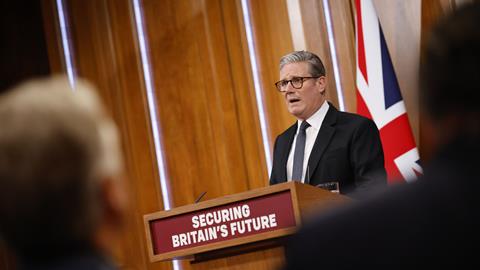Assuming the proposals in the recent immigration white paper go ahead, this will be one of the biggest shake ups to immigration for years. Following significant increases to net migration, the government’s aim is to reduce these figures, and the proposals will no doubt achieve that. However, both the rhetoric in Keir Starmer’s speech and the proposals within the white paper have attracted criticism from businesses and migrants, with fears the proposals will hinder growth, make it more difficult for businesses to fill vacancies and deter skilled migrants from coming to the UK.
Key proposals impacting businesses include: raising the skills threshold for sponsorship, meaning in most cases only graduate-level jobs will be eligible for sponsorship; likely further increases to salary thresholds; requiring all overseas nationals coming to the UK (including, for the first time, their dependants) to meet stringent English language requirements; and a 32% increase to the Immigration Skills Surcharge payable by sponsors (from £1,000 to £1,320 per sponsored worker per year of the visa for large employers).
A key aim of the government is to require employers to fill gaps in the labour market by upskilling the current resident workforce and by recruiting workers who are currently economically inactive, rather than hiring overseas nationals. Starmer’s statement that employers are ‘addicted to importing cheap labour’ however seems to be a bizarre misrepresentation of the facts, and flies in the face of numerous expert opinions. It is already difficult and very expensive for employers to hire and sponsor overseas nationals and there are already strict salary thresholds in place. Businesses sponsoring overseas nationals also have onerous reporting and record-keeping obligations, resulting in a significantly increased regulatory burden. Given all this, employers usually only sponsor overseas nationals when there is a genuine need for specialist knowledge or if they are finding it virtually impossible to recruit from the UK resident workforce.
It is also hard to understand Starmer’s assertion that curbing immigration will not impact growth. The proposed new rules, in tandem with recent tax changes, will surely serve to disincentivise many skilled and wealthy migrants from moving to the UK – especially if the much-criticised proposal comes into effect requiring migrants to have to spend up to 10 years in the UK (rather than the current five years) to obtain settlement and then British citizenship. Even those willing to wait that long for settlement may be put off by the costs, which will reach tens of thousands of pounds. The additional immigration fees, including the contribution towards the NHS payable by migrants (over £1,000 per adult per year in the UK) will make the UK an unaffordable option for many. Rising costs will also mean employers will be reluctant to sponsor workers. This may be the government’s aim but will surely make the UK a less attractive proposition for inward investment and less able to compete for the best global talent, stifling growth.
Furthermore, upskilling the domestic workforce will not solve the labour gaps in sectors such as care: the root problem is that salaries on offer, so often indirectly from government purses given many care homes provide their services to local councils, are too low to encourage domestic workers to take on these jobs. Those who are not economically active due to illness, study, early retirement or childcare costs are most unlikely to take on such roles. Without migrants to fill this gap, sectors like care will continue to suffer. In other areas, where there are genuine skills shortages, it will take years of concerted effort to upskill the resident workforce.
That said, immigration is currently high and there needs to be a debate around this, but this needs to be based on fact and expert analysis, not oversimplified, sweeping comments seeking to reduce a technical and complicated legal landscape to soundbites. Much is said about the importance of integration but references such as that immigration is leading to the creation of an 'island of strangers' make this less, not more, likely.
The white paper itself, despite its length, provides little detail in key areas. For example, beyond the government setting up a Labour Market Evidence Group, exactly what employers will be expected to do to show that they are investing in training is not clear, nor is how it will be determined which migrants are worthy of being granted settlement earlier and which are not. Importantly, those already here have also been left uncertain as to whether the 10 year settlement route will apply retrospectively to them. If so, that would be a most surprising move by the government, almost certainly leading to legal challenges on the basis of administrative law principles.
This lack of certainty is in itself unhelpful as both businesses and individuals will be reluctant to commit to moving to the UK when the future rules are so unclear. Immigration lawyers, businesses and overseas nationals now all await further details and the consultation later this year to see whether they address the many concerns and questions businesses, and those wishing to move to the UK, will have.
Kerry Garcia is head of employment, pensions and immigration at Stevens & Bolton
































5 Readers' comments